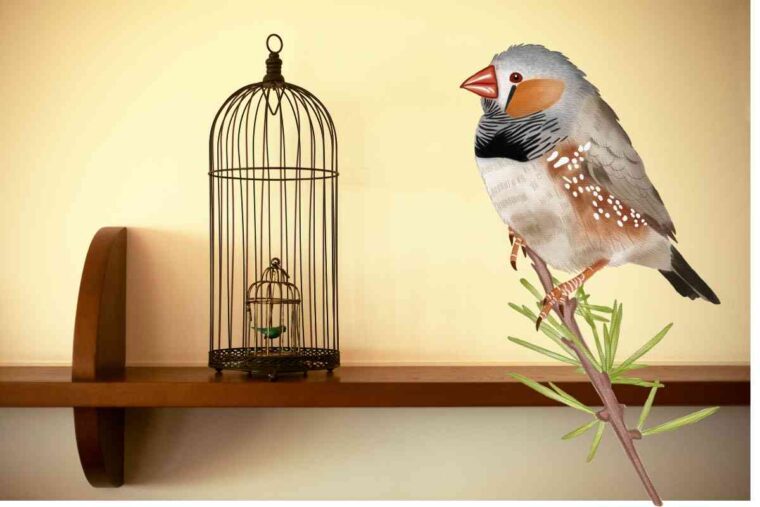Just like any other pet, it’s important to ensure that your finch is comfortable in its living space. A well-designed cage not only promotes physical health but also contributes to your feathered friend’s overall happiness and wellbeing. In this blog post, we’ll explore various ways you can make your finch’s cage more comfortable – from choosing the right size to providing toys and creating a cozy sleeping area.
Choosing the right size cage for your finch
When it comes to choosing the right size cage for your finch, there are a few things you need to keep in mind. First and foremost, the cage should be spacious enough to allow your bird to move around freely without feeling cramped or confined.
A good rule of thumb is to provide at least 2-3 feet of space per finch. For example, if you have two finches, a cage that measures 24x18x18 inches would be suitable. However, more space is always better.
It’s also important to consider the bar spacing on the cage. The bars should be close enough together so that your finch cannot escape but not so close as to make it difficult for them to move around comfortably.
Another factor you may want to consider is whether or not you will let your birds fly outside of their cage regularly. If you plan on giving them plenty of flight time outside of their home base, then a larger cage may not be necessary.
When selecting a cage size for your finch(s), prioritize ample living area where they can perch and spread their wings comfortably while still leaving room for toys and other accessories inside!
Also Read another article: How to Train a Finch? (Complete Guide)
Providing perches and toys for your finch to play with
Perches and toys are essential for the well-being of your finch. These items provide mental and physical stimulation, prevent boredom, and encourage exercise. When choosing perches, make sure they vary in size to exercise different foot muscles. Natural wood perches are great because they’re non-slippery and mimic a natural environment.
Toys should be chosen carefully as some can be dangerous or harmful to birds. Avoid toys with small parts that can be swallowed, sharp edges that can cause injury, or toxic materials. Choose toys made from safe materials like untreated wood or rope.
Rotate your bird’s toys frequently to keep them interested and engaged in their environment. Offer different types of toys such as swings, bells, ladders and puzzles to keep things interesting.
Keep an eye on how much time your finch spends playing with its toys versus resting or eating – too much playtime could indicate an issue with their diet.
The importance of proper ventilation in your finch’s cage
Proper ventilation is an essential factor to consider when setting up your finch’s cage. Good air circulation is vital for your feathered friend’s respiratory health.
A lack of proper ventilation can lead to the accumulation of harmful gases, such as ammonia, which can cause respiratory problems for your bird. It is important to ensure that fresh air flows through the cage and removes any odors or airborne toxins.
When selecting a finch cage, choose one with good airflow. Avoid cages with solid sides that hinder proper air circulation. Also, avoid placing the cage in areas where there may be drafts or direct sunlight.
It is recommended to clean the tray at least once a week since droppings produce ammonia gas which may affect birds’ lungs if not properly ventilated out of their environment.
Moreover, it has been noticed by some owners that adding plants around or inside the Finch’s Cage could also help absorb excess moisture and improve overall indoor air quality.
Selecting the best type of bedding for your finch’s cage
When it comes to selecting the best type of bedding for your finch’s cage, there are a few things to consider. First and foremost, you want a bedding that is safe and non-toxic for your bird. Avoid using cedar or pine shavings as they can emit harmful fumes.
Paper-based beddings are a great option as they are dust-free and absorbent. They also make cleaning up easier since you can simply scoop out soiled areas daily.
Another option is sandpaper or gravel paper, which helps keep your finch’s nails trimmed naturally. However, be sure to also provide other types of perches in addition to these rough surfaces as prolonged use could lead to foot problems.
If you prefer a more natural option, coconut fiber or hemp-based products are environmentally friendly and biodegradable choices that still offer good absorption properties.
Regardless of what type of bedding you choose, always monitor it closely for signs of mold or pests such as mites. Replace the bedding regularly (at least once a month) to maintain cleanliness in your finch’s cage and ensure their comfort.
Creating a comfortable temperature for your finch
Creating a comfortable temperature for your finch is crucial to ensuring their optimal health and happiness. Finches are sensitive to extreme temperatures, and they need a stable environment that mimics their natural habitat. Here are some tips on how to create the perfect temperature for your finch’s cage.
Firstly, you should place the cage in an area of your home where the temperature doesn’t fluctuate too much. Avoid placing it near windows or doors that can cause drafts or direct sunlight that can raise the temperature excessively.
Secondly, invest in a reliable thermometer to monitor the temperature inside your finch’s cage regularly. The ideal range is between 65°F to 75°F (18°C-24°C). Anything above or below these numbers could make them uncomfortable and even lead to potential health problems.
Thirdly, consider investing in heating pads or lamps during colder months if you live in cooler climates. These devices will help maintain a consistent temperature within your birdcage without causing any harm.
Ensure proper ventilation as high levels of humidity can be dangerous for birds’ respiratory systems leading to bacteria growth which causes various diseases among birds.
The benefits of adding a bird bath to your finch’s cage
Bird baths are not just for decoration; they serve a vital purpose in maintaining the health and well-being of your finch. By adding a bird bath to their cage, you are providing them with access to clean water for drinking and bathing.
Regular bathing is crucial for finches as it helps keep their feathers healthy and clean, preventing any potential infections or irritations. Additionally, it provides an opportunity for exercise and mental stimulation that can contribute to overall happiness.
When selecting a bird bath, make sure it is the appropriate size for your finch’s cage and has shallow water levels so they can safely splash around without risk of drowning. It’s also important to change out the water daily to prevent any buildup of bacteria or dirt.
You may even consider getting a bird bath with added features such as a built-in perch or misting system which can further enhance your finch’s comfort level. Adding a bird bath to your finch’s cage will provide numerous benefits that contribute to their physical and emotional well-being.
The role of natural light in your finch’s well-being
The role of natural light in your finch’s well-being cannot be overstated. Just like humans, birds need sunlight to thrive. Exposure to natural light has many benefits for your finch and can improve their overall health.
Firstly, natural light is an excellent source of vitamin D which is essential for strong bones and a healthy immune system. Without enough vitamin D, your finch may become weak and vulnerable to diseases.
Secondly, exposure to natural light helps regulate the bird’s circadian rhythm or internal clock. This means that they will have a more restful sleep at night and be more active during the day when exposed to regular daylight.
Thirdly, natural light can stimulate breeding behavior in certain species of finches. Sunlight triggers hormonal changes in birds that are important for mating rituals.
Maintaining cleanliness in your finch’s cage
Maintaining cleanliness in your finch’s cage is essential for their health and wellbeing. A dirty cage can lead to the growth of harmful bacteria, which can cause infections and disease. To keep your finch healthy, it’s important to clean their cage regularly.
Start by removing any uneaten food or soiled bedding from the bottom of the cage daily. This will prevent odors from building up and make it easier to do a deep cleaning later on. You should also remove any toys or perches that have become soiled with droppings.
Once a week, give the entire cage a thorough cleaning. Start by removing everything inside and washing them with soap and water. Then wipe down all surfaces of the cage with disinfectant spray before rinsing thoroughly with water.
It’s important to use safe cleaning materials when maintaining your finch’s cage as they are sensitive animals who are easily affected by harsh chemicals. Avoid using bleach or other strong cleaners that may be toxic to birds.
Creating a comfortable sleeping area for your finch
Creating a comfortable sleeping area for your finch is crucial to their overall well-being. Finches need plenty of rest and sleep throughout the night to maintain good health. Here are some tips on how to create a cozy sleeping spot for your feathered friend.
First, choose an appropriate nesting material that is soft and safe for your finch. Avoid using materials such as fabrics or cotton balls, which can be dangerous if ingested by your bird. Instead, opt for natural materials like shredded paper or dried grasses.
Secondly, make sure the sleeping area is in a quiet part of the cage away from any distractions or noise that could disrupt your finch’s sleep patterns. Also, ensure it’s not in direct sunlight during daytime hours when they’re napping.
Thirdly, consider adding a small perch inside the sleeping area so your finch can comfortably roost while they snooze.
Keep the bedding fresh and clean regularly – replace old nesting material with fresh ones every week to prevent buildup of bacteria and fungi.
Did I answer your query about How to make a finch’s cage more comfortable
Creating a comfortable environment for your finch is essential to its overall well-being. By providing the right size cage with proper ventilation, perches and toys for playtime, suitable bedding, appropriate temperature control and natural light exposure as well as maintaining cleanliness in their living space will ensure that your pet finch stays healthy and happy.
Adding a bird bath to their cage can also provide additional mental stimulation while promoting good feather health. Remember that each finch has unique preferences so make sure you observe their behavior carefully to see what they enjoy most.
By following these simple steps, you can create a safe and comfortable home for your feathered friend. Investing time and effort into making your finch’s life more enjoyable will not only benefit them but it will also bring joy to you as an owner!

